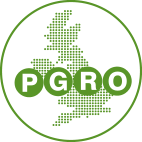CB2301 - Crop Update - Pests and Diseases
Winter bean diseases
Some winter bean crops have suffered frost damage over the winter period, particularly if drilled in early October. As a result of this and continued wet weather, levels of disease in some crops are high. Chocolate spot and Cercospora are being identified in crops, and many growers may be thinking of applying an early fungicide. Fungicide treatments in beans are mainly protectant and it is important to prevent further development in high risk situations. There are several active substances available in beans that will reduce further chocolate spot development, and an early application may be required in some circumstances if weather continues to be unsettled.
Azoxystrobin (e.g., Amistar), benzovindiflupyr + prothioconazole (e.g., Elatus Era), boscalid + pyraclostrobin (e.g., Signum), metconazole (e.g., Sunorg Pro) and tebuconazole (e.g., Folicur) will provide good protection against chocolate spot, and growers should check earliest growth stage restrictions for some of these actives.
Pea moth
Pea moth traps should be ordered in time for the coming season. Pea moth activity can start at the beginning to middle of May and pea moth is one of the most damaging pea pests in the UK. The caterpillars (larvae) feed on peas within the pod causing damage to quality.
Pea moth monitoring systems are available from the following suppliers:
Koppert UK Ltd. www.koppert.co.uk
Dragonfli Ltd. Tel: 01376 563322. www.dragonfli.co.uk
Andermatt UK. Tel: 07939 395059. Email: contact@andermattuk.com www.andermattuk.com
Traps are received in sets of one or two, depending on the supplier. One set is required for each block of peas, for example, a farm having all the pea fields within a restricted area need only purchase one set of traps, but in fields of 50 ha or more two sets are required.
Traps must be placed in the pea crop in early to mid-May.
Spray date forecasting will begin in May and forecast dates can be obtained from the PGRO website at https://www.pgro.org/pea-moth/.
Pea Midge
PGRO, with PheroSyn Ltd. and Koppert UK, have evaluated pea midge pheromones and trapping systems to ensure that they remain available to growers.
The pea midge system is available from Koppert UK www.koppert.co.uk, or by contacting Richard Binks at RBinks@koppert.co.uk, and growers should order systems now in time for the coming season.
Aphids
The first 2023 issue of the Aphid bulletin is now available through the Rothamsted Insect Survey website Aphid Forecast | Insect Survey. Headline aphid news is available on the Rothamsted Twitter account: @Rothamsted_RIS https://twitter.com/rothamsted_ris?lang=en. For information about aphid management in legumes go to Agronomy Guide | PGRO or contact the PGRO advisory service on 01780 782585.
Pea and Bean Yield Enhancement Network (YEN)
YEN membership is open, and available to anyone including farmers, agronomists, and researchers. Sponsorship is available on a first come, first serve basis.
2023 Harvest Membership includes:
• One entrance into the annual Pea or Bean YEN benchmarking network (Members can enter multiple fields; additional charges apply).
• One free Soil analysis (Details and restrictions to be confirmed).
• A comprehensive report on your crop’s performance.
• One ticket to the Annual YEN Conference.
• PGRO Foot rot risk (peas).
• Lancrop leaf tissue and seed nutrition*.
• Askew and Barrett Ltd grain sample market quality assessment (peas)*.
• PGRO grain bruchid beetle damage assessment (beans)*.
*Analysis may be subject to limitations on crop development stage, date, or availability (enquire via email at peayen@adas.co.uk for more information).
The link for registration is https://yen.adas.co.uk/networks-projects
For any information about pest and disease management please contact PGRO at 01780 782585 or becky@pgro.org.




